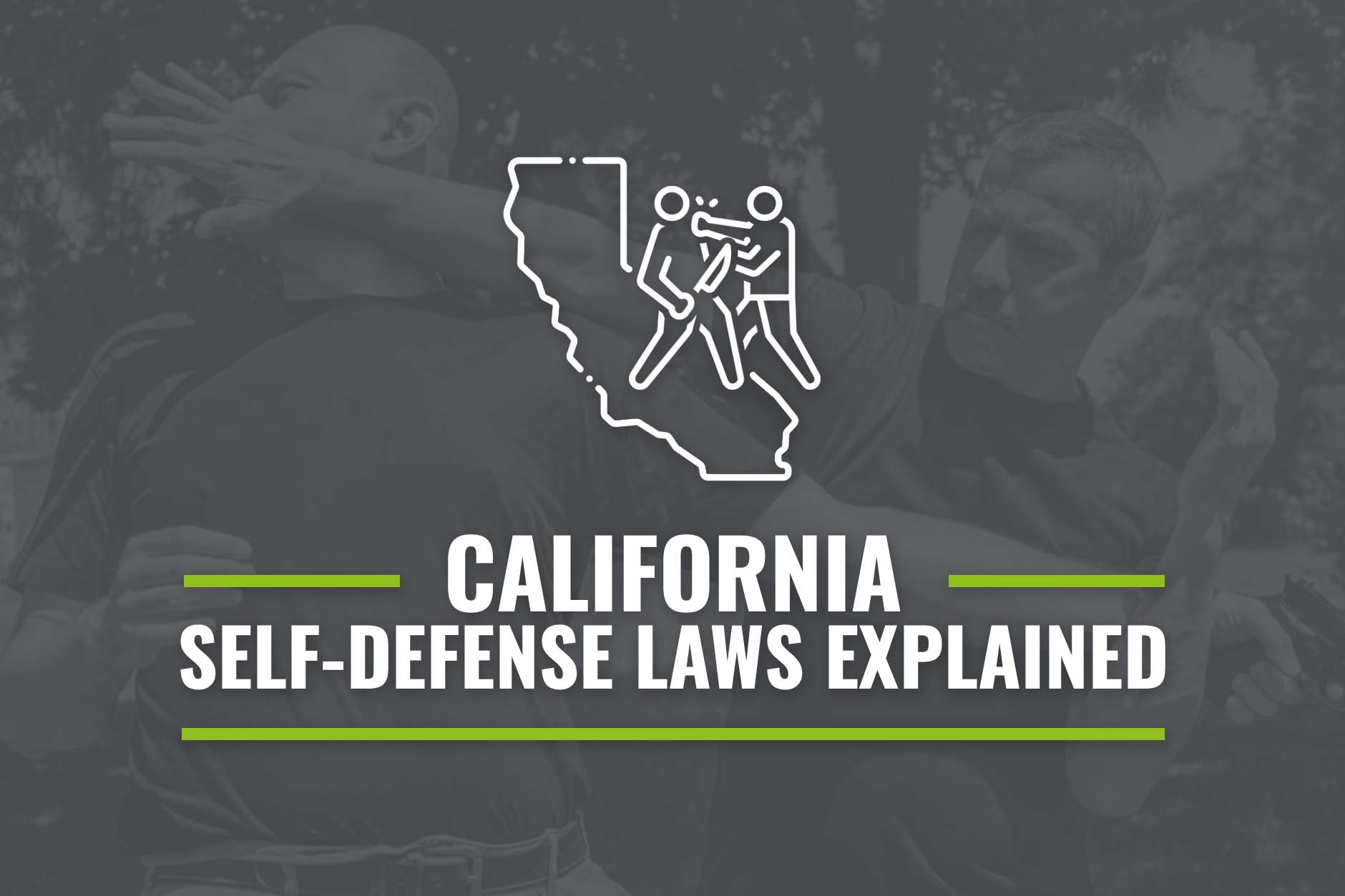Table of Contents
Quick Summary
Self-defense in California means using reasonable force to protect yourself, someone else, or your property from immediate harm. The force must match the threat faced, and your belief in the danger must be reasonable. In very specific situations, deadly force is permissible, but only under strict conditions. Special provisions like the Castle Doctrine offer unique protections. Each case, such as battery, resisting arrest, murder, and domestic violence, has specific legal considerations.
The information on this page does not constitute legal advice. Consult an attorney for further guidance before using this information.
California’s self-defense laws provide a framework for using reasonable force to protect oneself or others. Mistakes in defensive actions can escalate into significant legal issues. This guide will explore the key aspects of California’s self-defense laws, covering when and how to legally defend yourself and the specific protections available under the law.
If you’ve been accused of battery, resisting arrest, murder, or domestic violence in San Diego County, Attorney David Rubin at Rubin Law Office can help you determine if self-defense may be a viable defense for your case.
Get answers to your legal questions. Speak with a San Diego County criminal defense lawyer about your case > (619) 719-1087
What Is Self-Defense Under California Law?
In California, self-defense means using reasonable force to protect yourself, someone else, or your property from immediate harm. This protection is defined under the California Penal Code, particularly sections 197, 198.5, and 692-694. At its core, self-defense is about acting when you genuinely believe you or someone else is in imminent danger, and using force is necessary to prevent this harm.
Justifiable Use of Force and Reasonable Belief
Justifiable use of force in California involves using only the necessary amount of force to protect against immediate harm. To legally justify self-defense, you must have a reasonable belief that you or someone else is in imminent danger. This means that an average person, knowing what you knew at the time, would believe there was an immediate threat requiring action. For example, if someone threatens you with a punch, responding with non-lethal force might be justified. However, excessive force, such as using a weapon in that situation, would not be justified.
Can You Use Deadly Force?
In certain situations, the use of deadly force is legally permissible in California. However, this is subject to strict conditions to ensure that such force is used only when absolutely necessary.
Deadly force, which can cause death or serious injury, is legally permissible if you believe that you or someone else is facing an imminent threat of death or serious injury.
When Deadly Force is Legally Justified
The California Criminal Jury Instructions (CALCRIM) 3470 and 505 provide detailed guidance on these points. CALCRIM 3470 covers the general principles of self-defense, while CALCRIM 505 specifically addresses justifiable homicide in self-defense. Deadly force is justified if:
- Imminent Threat: You reasonably believe that you or someone else is in imminent danger of being killed or seriously injured.
- Proportional Response: The force used must be proportional to the threat. Using more force than necessary is not justified.
- Necessity: The use of deadly force must be immediately necessary to prevent the threat.
Misjudging the situation can lead to serious legal consequences, including criminal charges.
Types of Self-Defense
Self-defense in California covers various scenarios where you may need to protect yourself, others, or your property. Each type of self-defense has specific legal considerations and limitations to ensure that the force used is appropriate.
| Type of Self-Defense | Legal Considerations | Details | Penal Code / Common Name |
| Defense of Yourself and Others | Use reasonable force if you believe you or someone else is in imminent danger | Force must be proportional to the threat. | Penal Code 197 / Justifiable Homicide |
| Defense of Property | Use reasonable force to protect property from being unlawfully taken or damaged | Deadly force is generally not justified to protect property alone. Castle Doctrine allows deadly force against intruders in the home. | Penal Code 198.5 / Castle Doctrine |
Defense of Yourself and Others
You have the right to defend yourself and others from immediate harm, using reasonable force if you believe that you or someone else is in imminent danger. The force used must be proportional to the threat faced. One notable case is People v. Humphrey, where the court recognized that a person’s belief in the need to defend themselves can be influenced by their experiences and circumstances. The court does consider the defendant’s perspective and situation when evaluating the reasonableness of their actions.
Stand Your Ground
California law allows individuals to defend themselves without the duty to retreat when faced with an imminent threat. Unlike some states, California does not have a specific statute codifying Stand Your Ground, but the principle is recognized in case law and jury instructions.
You can stand your ground and use reasonable force to defend yourself if:
- You are in a place where you have a legal right to be.
- You reasonably believe that using force is necessary to prevent harm.
- The force used is proportional to the threat.
This means that if you are attacked in a public place or in your home, you do not have to retreat before using force to protect yourself.
Defense of Property
Defending your property is also covered under California law, but there are stricter limitations. You can use reasonable force to protect your property from being unlawfully taken or damaged. However, using deadly force to protect property alone is generally not justified.
The Castle Doctrine
The Castle Doctrine, as defined by California Penal Code 198.5, provides an exception to this rule. It allows homeowners to use deadly force against an intruder in their home under certain conditions. This protection applies only within the home and does not extend to other types of property.
The Castle Doctrine allows you to use deadly force against an intruder in your home if:
- The intruder unlawfully and forcibly enters or attempts to enter your home.
- You have a reasonable belief that the intruder poses an immediate threat of death or severe injury.
This law provides strong protections for homeowners, allowing them to defend their homes without the obligation to retreat, as long as the conditions are met.
How to Prove Self-Defense in Court
To successfully claim self-defense, you need to provide evidence that supports your belief that you or someone else was in imminent danger and that the force used was necessary and reasonable under the circumstances.
Legal Criteria for Self-Defense
In California, the legal criteria for self-defense include showing there was an imminent threat, that your belief in the need to use force was reasonable, and that the force used was proportional to the threat. When evaluating a self-defense claim, juries consider several factors as outlined in the California Criminal Jury Instructions:
- Circumstances of the Threat: All circumstances surrounding the threat, including the actions and intentions of the aggressor.
- Defendant’s Perspective: The defendant’s knowledge, experience, and situation at the time of the incident.
- Proportionality of Force: Whether the force used was appropriate and necessary to prevent harm.
Application of Self-Defense in Specific Crimes
Self-defense can be applied differently depending on the specific crime involved. California law recognizes self-defense in cases of battery, resisting arrest, murder, and domestic violence, each with its unique considerations and legal implications.
Self-Defense in Battery
In cases of battery, self-defense is a valid defense if you can show that you used reasonable force to protect yourself or another person from immediate physical harm. The key is to prove that the force you used was proportional to the threat posed by the aggressor. For instance, if someone attempts to punch you, blocking the attack or using non-lethal force can be considered justified self-defense.
Self-Defense in Resisting Arrest
Resisting arrest presents a more complex scenario for claiming self-defense. Generally, you cannot use force to resist a lawful arrest by a police officer. However, if an officer uses excessive force or engages in unlawful conduct, you may have the right to defend yourself. To successfully claim self-defense in this scenario, be prepared to demonstrate that the officer’s actions were unlawful and that your response was necessary to protect yourself from harm.
Self-Defense in Murder
Self-defense in murder cases is closely examined due to the severity of the charges. To prove self-defense, you need to show that you genuinely believed you were in immediate danger of being killed or seriously injured, and that using deadly force was necessary to prevent this threat. The force you use must also be proportional to the threat. Using excessive force can weaken your self-defense claim and result in serious legal consequences.
Imperfect Self-Defense
Imperfect self-defense occurs when you have an honest but unreasonable belief that you are in imminent danger and that deadly force is necessary. While this does not fully exonerate you, it can reduce a murder charge to voluntary manslaughter.
Self-Defense in Domestic Violence Cases
In domestic violence cases, self-defense can be used to justify actions taken to protect oneself or another household member from harm. The dynamics of domestic violence can be complex, and courts consider factors such as the history of abuse and the immediacy of the threat. Building a solid defense for domestic violence charges is very important. Domestic violence convictions can impact custody arrangements in divorce cases. Demonstrating that your actions were a necessary response to protect against imminent harm can be crucial in these cases.
Schedule Your Free Criminal Defense Consultation
Navigating self-defense laws can be challenging, especially when facing criminal charges. It’s important to consult a criminal defense lawyer if you’ve been accused of a crime. An experienced attorney can ensure your rights are protected and your case is effectively presented.
Located in Carlsbad, California, Rubin Law Office specializes in handling self-defense cases throughout San Diego County. Attorney David Rubin can provide the expertise and support needed to navigate the legal system. You can schedule a free consultation with Attorney Rubin by filling out an online contact form, calling (619) 719-1087, or pressing the live chat button on this page.
The information on this page does not constitute legal advice. Consult an attorney for further guidance before using this information.

Attorney David Rubin
Attorney David Rubin is a criminal defense and personal injury lawyer based out of Carlsbad, CA. Attorney Rubin serves clients throughout San Diego County and has been practicing law for over a decade. When not working, David can be found surfing, attending CrossFit classes, or eating asado.
 (619) 719-1087
(619) 719-1087



